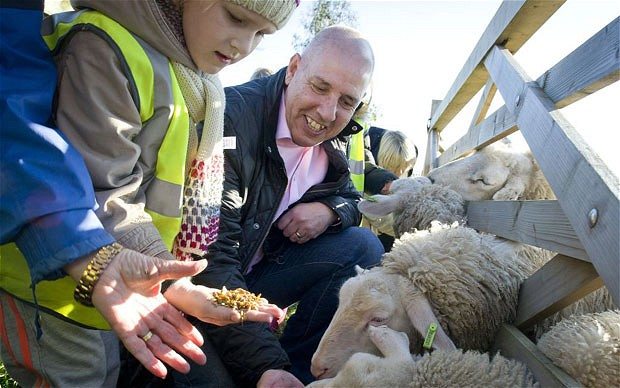‘Where does cheese come from?” asks the guide showing children around Barleylands, a farm in Essex. “Asda,” comes the reply from one of the youngsters.
By the end of the trip, the visiting primary school class is under no illusion about the origins of dairy products, reports The Telegraph.
Chris Philpot, one of the directors of the farm in Billericay, says he’s trying to achieve a similar transformation with his bank’s understanding of his operation.
He’s been joined for the day by Ian Cowie, chief executive of business and commercial banking at Royal Bank of Scotland. “I see this as like showing the children around the farm,” jokes Philpot. “They leave with a better understanding of what we do here.”
Mr Cowie, who is in charge of 10,000 small business staff at RBS, is put to work cooking with the children in the morning – part of the farm’s not-for-profit education activities – and spraying crops in the afternoon.
“It’s not a gimmick,” Cowie insists. Indeed, RBS relationship managers have made around 8,000 similar working visits to small business customers over the past year. The point is to address arguably the second most common complaint small business owners have about banks, after the interminable clamour over access to finance.
Namely, that banks’ sales culture destroyed the traditional role of the relationship manager, and with it, many companies’ rapport with their lender.
Andrew Holgate, a former RBS banker, recently confirmed what the Federation of Small Businesses and entrepreneurs have been arguing for some time: “The relationship manager isn’t the decision-maker anymore – he’s a tool to extract income from customers. They are glorified salesmen these days.”
Clearly, Mr Cowie wouldn’t endorse that description, but he does admit there’s a job to be done to “educate” and “professionalise” relationship managers who were hired in the years running up to the financial crisis.
“When I joined, I was on the till, did my banking exams, a bit of every job, before you work your way up through the organisation. You learnt from your mistakes quickly. If you join the bank today, it’s not quite the same. We’re going back a little bit to those basic professional skills and making sure our guys have got them.
“During the heady days [just before 2008], the level of experience in the business was not what it had been when I came in. There’s an acknowledgment that we need to go back to a relationship manager driven model.”
Along with working visits to customers’ companies – each relationship manager must do at least two each year – the part-nationalised bank is also sending its front line small business staff back to school.
Through an accredited examination programme, they are tested on skills their customers might have hoped they would already be up to speed on: rating risk and how to judge applications for loans, for example.
Staff that specialise in a particular industry will also go through a tailored module – with bankers that work with farmers put through their paces with the help of the National Farmers Union, for example. The idea is to get consistency in the bank’s decisions and behaviour, Cowie says. “We did have a period of fighting fires but now, getting everyone to a similar level is really important.”
Evidence of inconsistent decisions across the industry can be found in the more than one in three small businesses that used an independent appeals process to successfully challenge a bank’s lending decision, usually by simply escalating it to a more senior banker.
“I don’t really understand why the other banks aren’t doing this,” says Cowie.
He adds that the initiative is just as relevant for the many small businesses who never borrow from their bank. “If our people are inexperienced, unprofessional and lacking confidence, the customer gets a bad outcome. If they’re the opposite, we’ve got an advantage over competitors.”
As for the days spent working with customers, Cowie adds: “I can’t spend a day with Chris and not get a better understanding of his business. Anybody can look at a balance sheet but it’s not that easy to translate it to the real world. If you come to a place like this, the balance sheet comes to life.”
But what does Mr Philpot make of the scheme? “This will have been worthwhile if the bank says yes when some other farmer needs his overdraft extended because he wants to wait two weeks for the price of wheat to rise.”


